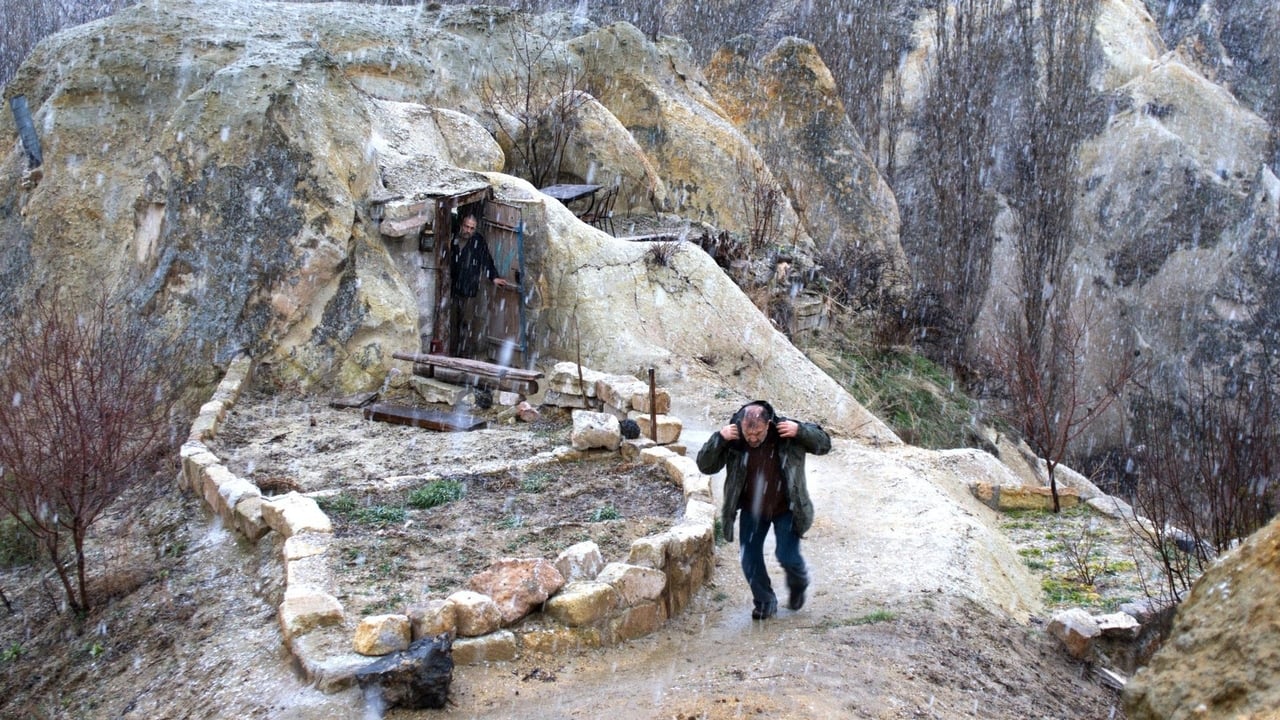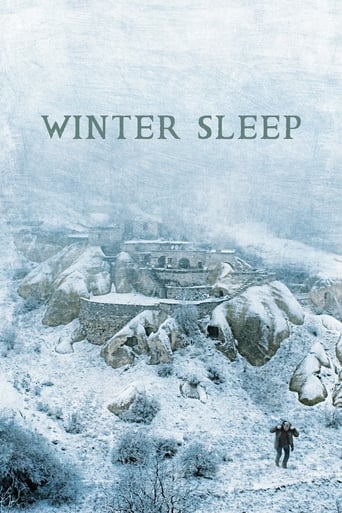



Powerful
Am I Missing Something?
It's fun, it's light, [but] it has a hard time when its tries to get heavy.
View MoreA story that's too fascinating to pass by...
NBC, the director is an engineer and philosopher of axiology. His technical skill is gifted with an artistic approach. He's not directing, he's mastering his thoughts on screen. This film tells a story about values, relations, customs, behaviours and simply "human things." It's a little bit long but it's also part of the story. You have fun in life, as well as boredom. You have time, as well as a need of time continuously. A moment may be too long but life may come short. We're not satisfied with what we have. Time is an example of this valuation. Time is a measure of our relativity. Winter Sleep demonstrates this in an artistic way. If you're a kind of curious, you'll ask some questions when the film is over. Human relations will be a philosophical opportunity. You'll enjoy bounding ties between relations and relativity.
View MoreThere would seem to be something inherently uncinematic about the chamber drama: a work tied to one, domestic space and the conversations that ensue therein. With Winter Sleep, rightly celebrated Turkish auteur Nuri Bilge Ceylan proves, like Bergman before him, that the chamber drama can indeed be high cinema. While most of the scenes take place in interiors, in only a few different rooms, Ceylan and DP Gokhan Tiryaki create brilliant master- shots in which the characters converse. There are a handful of exteriors of the Anatolian steppe and they are, characteristic of Ceylan, exceptionally beautiful. Interior or exterior, the color palate of the film is beyond reproach- consisting, as the title suggests, almost entirely of winter hues.One of the themes that, it seems to me, connects Celyan's films is the gradations of power, sometimes brutally absolute power, that people wield over others in contemporary Turkish society. In the director's "Three Monkeys" modern Turkey was portrayed as an almost feudalistic society, except that capitalism had enabled different layers of classes, and thus different layers of serfdom. The bourgeois suffer for the infractions of the wealthy, and the poor suffer for those of the bourgeois. In "Winter Sleep" the power dynamics are more emotional than economic, though the latter still comes into play. Indeed, as much as this film consists of interactions between family members in private spaces, it may subtly be Ceylan's most socio-political statement. The characters are former Istanbulite "cultural elites" holed up in the majestic if impoverished Turkish steppe, most focally Aydin, a former actor and son of a local land lord who has uncomfortably inherited his dad's power, as well as the coldly beautiful ancestral home that he has converted into a picturesque hotel. Aydin tries to shield himself from moral responsibility for the misery imposed on his destitute tenants, a struggle for which his wife Nihal tries and fails to assume responsibility. Aydin consistently tries to blind himself from his real affect on the world by commenting on society in a weekly newspaper column in which he tries to come off as bearing properly Turkish sensibilities- promoting a fine line between "modern thinking" and religious propriety, even though he has no use for religion, is of Europeanized taste, and seems more comfortable chatting with his foreign guests in English than relating to the local people, or indeed, his family. The most consistent theme in the interactions between Aydin, his wife, and sister Necla is whether turning the other cheek will lead one's tormentor to see the wrong of their ways. These characters do, indeed, seem to employ this technique in their interactions. Nihal, for instance, accuses Aydin of causing her misery. Aydin asserts that he is a "modern husband" and that she is "free to go as she pleases", though reminds Nihal that she will be impoverished if she divorces him. He then offers to give her space by rejoining society- Istanbul, hoping that she will feel guilty for hurting his feelings and ask him to stay. This passive-aggressive give-and-take is repeated in superficially different ways throughout the film between different sets of the three relatives. On the verge of leaving for Istanbul for the winter to give Nihal and Necla some space, Aydin instead goes on a drunken hunting trip with an old friend and returns to the hotel, bearing a slain rabbit as an offering to his family. The only internal dialog in the film is its last lines, in which Aydin acknowledges to himself, though not to his family, his terror of the thought of being without them even though he knows they no longer love him. The family thus remains stranded together in the isolated, beautiful ruin of their ancestral home, Ceylan's metaphor for contemporary Turkish society. Consistently hoping the other will implicate themselves for the misery around them, the characters emotionally oppress one another by telling each other that their unhappiness is their own doing since they are all, after all, free to do as they please in the modern state of Turkey. The "freedom" of a supposed modernity is thus the medium by which society's subjects incriminate one another. While Ceylan's film is most specifically an allegory of modern Turkey, it could serve as commentary on the oppressive freedom of "liberal democracies" everywhere.
View MoreThere is no gainsaying that this is an incredibly beautiful movie, or that the dialog is well written. The problem is that there is much, too much of it. Comparisons to Shakespeare overlook the fact that Shakespeare is a marvel of economy - and also that he wrote action plays, by and large. Each of the dialogs is well-written - but there are too many of them. And with all the talk, some important points of character are never resolved. The central character is Aydin, a retired actor and heir to a number of rental estates in Anatolia. His wife is decades younger. How did they meet? How did the unlikely marriage take place? What did she want or expect? Etc.None of this is addressed - instead everything is expressed in present tense. No one except Necla (Aydin's sister) has a personal history, and even that is only partially described. But all of this is actually pretty important to understanding how they came to where they are.I don't mind pictures in which nothing much happens, which is certainly this one. I do have a problem with movies that seem premised on the notion that simple artiness is sufficient. It isn't.Finally, the incredibly dull musical score consists of various piano selections from the romantic masters - sort of like that Bergman picture in which the only music was a Bach unaccompanied cello suite. That tells you all you need to know.
View MoreI read some reviews below and ı am surprised. people say that conversations are meanless and long etc... This kind of criticism and comments make no sense. This is not a Hollywood movie which characters say everything directly just because films like these are making for teenage minded people. I mean sometimes you can not say what you want to. sometimes you use long path to home... moreover dialogs are serving the philosophy of movie. This movie is the best of Nuri Bilge's, about ego and contrasts between arrogance-virtue. You can also thing about your attitudes, this film makes you to do so. Main characters's (Aydin) last words are impressive, with these words film having a emotional and touching side. A good movie for people who like thinking about themselves
View More